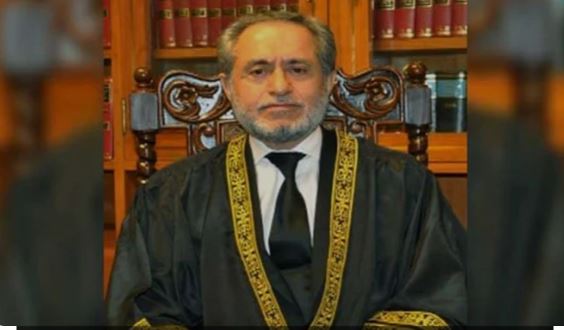ISLAMABAD – Supreme Court Justice Jamal Khan Mandokhail whether an army officer possessed the enough expertise and experience to hand down a death sentence while hearing a civilians’ trial in the military courts.
A SC seven-member constitutional bench, led by Justice Aminuddin Khan, conducted the hearing. Defense Ministry’s counsel Advocate Khawaja Haris and law officer appeared before the court for arguments.
Justice Jamal Khan Mandokhail, Justice Muhammad Ali Mazhar, Justice Hassan Azhar Rizvi, Justice Musarrat Hilali, Justice Naeem Akhtar Afghan and Justice Shahid Bilal Hassan are other members of the bench.
Justice Jamal Mandokhail questioned the procedure of trials in the military courts, and sought clarification.
Justice Musarrat Hilali remarked, “The officer conducting the trial doesn’t issue the verdict themselves; the case is forwarded to a senior officer who decides the outcome. How can an officer who didn’t hear the trial deliver the decision?”
Justice Mandokhail remarked, “I have spent 34 years in this field, yet I don’t consider myself complete. How does an army officer gain sufficient expertise to issue a death sentence?”
Khawaja Haris submitted that he would comprehensively address the procedure of military trials in the second part of his arguments.
Justice Mandokhail observed, “The Army Act applies only to the military. We will consider whether military officers are granted basic rights and justice.”
Justice Hilali asked for clarity on who writes judgments in military courts. “From my understanding, one officer hears the case, but the commanding officer decides the punishment. How can someone who hasn’t heard the case make such decisions?”
The defense counsel clarified that the relevant branch in the military assisted in drafting judgments.
Justice Hilali asked, “You mentioned the military trials in the US; who acts as judges in such cases there?” Justice Muhammad Ali Mazhar remarked that the court-martial proceedings worldwide involved the officers. Haris explained that the officers involved in the court-martials are experienced to conduct trials. Justice Mazhar asked if those officers also have the legal qualifications.
Justice Hilali raised another question, citing an incident where an army chief’s aircraft was told to leave the country with airport lights turned off, putting the passengers at danger. Haris countered, “How can someone not on the plane hijack it?”
Justice Hilali observed, “Despite the risk and limited fuel, the plane was endangered.” Haris responded, “I will avoid political commentary but note that the Supreme Court later reviewed the incident and found sufficient fuel was available,”.
Justice Hilali remarked, “The incident led to the martial law, yet the trial did not proceed in a military court,” Haris explained that hijacking is not listed as an offense under the Army Act, hence it could not be tried in a military court.
Justice Aminuddin Khan acknowledged the distinction and suggested moving forward.
However, Justice Hilali raised another question, asking where a trial would take place if a hijacking involved a military aircraft.
Additional Attorney General Amir Rehman informed the court that around 5,000 individuals were accused in the May 9 incidents, of whom 105 were sent to the military courts with concrete evidence of their presence at the crime scenes.
Haris argued that the Army Act applied only to individuals violating the Official Secrets Act and not to every terrorist.
Justice Hilali asked whether the military courts conducted trials based on the FIRs registered at the police stations.
“How can the military courts proceed on cases registered under the Pakistan Penal Code and ATA? The three FIRs we have reviewed do not include provisions of the Official Secrets Act.”
Haris explained that additional provisions could be included after further investigation.
Justice Mazhar observed, “There is a specific procedure for adding provisions. Was the trial based solely on police investigations?” Haris clarified, “When a suspect is in military custody, the investigations follow a separate system,”.
The additional attorney general mentioned that the court had been presented with only three cases while 35 FIRs and 5,000 suspects were involved in the May 9 incidents. Only the 105 individuals whose presence was proven are being tried in the military courts.
The Supreme Court adjourned the hearing of the military courts case until Monday.









